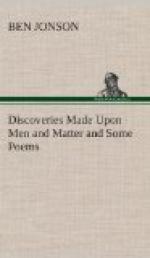Ignorantia animae.—I know no disease of the soul but ignorance, not of the arts and sciences, but of itself; yet relating to those it is a pernicious evil, the darkener of man’s life, the disturber of his reason, and common confounder of truth, with which a man goes groping in the dark, no otherwise than if he were blind. Great understandings are most racked and troubled with it; nay, sometimes they will rather choose to die than not to know the things they study for. Think, then, what an evil it is, and what good the contrary.
Scientia.—Knowledge is the action of the soul and is perfect without the senses, as having the seeds of all science and virtue in itself; but not without the service of the senses; by these organs the soul works: she is a perpetual agent, prompt and subtle; but often flexible and erring, entangling herself like a silkworm, but her reason is a weapon with two edges, and cuts through. In her indagations oft-times new scents put her by, and she takes in errors into her by the same conduits she doth truths.
Otium Studiorum.—Ease and relaxation are profitable to all studies. The mind is like a bow, the stronger by being unbent. But the temper in spirits is all, when to command a man’s wit, when to favour it. I have known a man vehement on both sides, that knew no mean, either to intermit his studies or call upon them again. When he hath set himself to writing he would join night to day, press upon himself without release, not minding it, till he fainted; and when he left off, resolve himself into all sports and looseness again, that it was almost a despair to draw him to his book; but once got to it, he grew stronger and more earnest by the ease. His whole powers were renewed; he would work out of himself what he desired, but with such excess as his study could not be ruled; he knew not how to dispose his own abilities, or husband them; he was of that immoderate power against himself. Nor was he only a strong, but an absolute speaker and writer; but his subtlety did not show itself; his judgment thought that a vice; for the ambush hurts more that is hid. He never forced his language, nor went out of the highway of speaking but for some great necessity or apparent profit; for he denied figures to be invented for ornament, but for aid; and still thought it an extreme madness to bind or wrest that which ought to be right.




